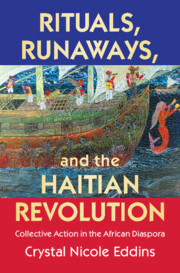Book contents
- Rituals, Runaways, and the Haitian Revolution
- Cambridge Studies on the African Diaspora
- Rituals, Runaways, and the Haitian Revolution
- Copyright page
- Dedication
- Contents
- Figures
- Tables
- Acknowledgements
- Introduction
- I Homelands, Diaspora, and Slave Society
- 1 “We Have a False Idea of the Negro”: Legacies of Resistance and the African Past
- 2 In the Shadow of Death
- II Consciousness and Interaction: Cultural Expressions, Networks and Ties, Geographies and Space
- III Collective Action and Revolution
- Conclusion
- Notes
- References
- Index
2 - In the Shadow of Death
from I - Homelands, Diaspora, and Slave Society
- Rituals, Runaways, and the Haitian Revolution
- Cambridge Studies on the African Diaspora
- Rituals, Runaways, and the Haitian Revolution
- Copyright page
- Dedication
- Contents
- Figures
- Tables
- Acknowledgements
- Introduction
- I Homelands, Diaspora, and Slave Society
- 1 “We Have a False Idea of the Negro”: Legacies of Resistance and the African Past
- 2 In the Shadow of Death
- II Consciousness and Interaction: Cultural Expressions, Networks and Ties, Geographies and Space
- III Collective Action and Revolution
- Conclusion
- Notes
- References
- Index
Summary
A historical background of Saint Domingue within the wider context of the European colonization will be the focus of the second chapter, which frames the island originally known to the Taíno as Ayiti as a space of human commodification, death, and slave resistance since the first Africans arrived in 1503. Less than twenty years after arrival, enslaved Africans were constantly escaping, taking up residence with remaining Taíno in the mountains, and participating in organized revolts. These rebellions were reactions to the brutal treatment of Taíno and Africans in the encomienda labor system, the emergence of the slave plantation-based sugar economy and processes of racialization, and the exorbitant death rates of enslaved people. In examining the immediate social world of enslaved people, I look at their social lives and recreation, particularly cultural and spiritual creations, considering them as processes of enculturation that introduced new Africans to local idioms and modes of survival.
- Type
- Chapter
- Information
- Rituals, Runaways, and the Haitian RevolutionCollective Action in the African Diaspora, pp. 66 - 108Publisher: Cambridge University PressPrint publication year: 2021

